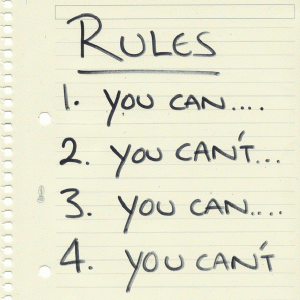 At my daughter’s summer camp, counselors have made a concerted effort over the past several years to eliminate bullying, wayward behavior, and mischief. In fact, the camp owner and management team recently decided to advertise their camp as an environment where meanness has no place. And, as such, this camp season they required all campers and parents to sign a code-of-conduct agreement where twenty-two camper expectations were listed in detail. Sounds reasonable and responsible, yes?
At my daughter’s summer camp, counselors have made a concerted effort over the past several years to eliminate bullying, wayward behavior, and mischief. In fact, the camp owner and management team recently decided to advertise their camp as an environment where meanness has no place. And, as such, this camp season they required all campers and parents to sign a code-of-conduct agreement where twenty-two camper expectations were listed in detail. Sounds reasonable and responsible, yes?
Well, regrettably, in spite of their sound intentions, behavior at this camp has not improved — it’s gotten worse. And this summer, several campers were repeatedly disciplined and threatened with expulsion for their unruly actions.
Indeed, this situation is comparable to what is happening on college campuses across the U.S. Are you aware that underage students are abusing alcohol at alarming rates? It’s true, and the standard university response is to set more stringent expectations and throw more rules at the student population, even though (as guidelines grow) behavior continues to spiral downhill. We see a similar situation in pro sports. Even with increasingly intense player-development strategies, the amount of dysfunctional actions are escalating by the day, both on and off the playing field.
How much more proof do we need that setting expectations does not inhibit errant behavior?
But why is this alarming trend occurring? And if setting stricter standards doesn’t work, what can be done to eliminate hurtful and disruptive conduct?
The answer, believe it or not, has to do with a person’s free will and inherent functioning — and what happens when these innate attributes are compromised. In setting expectations, leaders are actually pointing people in the direction of (and thus energizing) what they are trying to avoid in the first place. To illustrate, if I tell my son how to behave as he embarks upon his college journey this week, my expectations are likely to clash with his own intuition, resulting in bound-up thinking (the opposite of a clear head) when he finds himself in a sticky situation — his first fraternity party, for example.
Instead, what camps, schools, teams, leagues, families, and organizations must do is point their charges inward. Teach them that their mind-sets are naturally in flux — from a high feeling state (mood), their choices are automatically fruitful and empowering, but from a low feeling state, if they act, their choices will be desperate and destructive. We must promote and inspire free will by not telling others what is right or wrong, but by encouraging others to act when their state of mind is elevated and, thus, they are viewing life with compassion, love, resilience, and strength. From this perspective, a person’s behavior is always productive, for themselves and those around them.
The only way to encourage productive behavior is to point people inward. Expectations point people outward, toward somebody else’s definition of right and wrong.
The bottom line is that telling others what to do, what to look out for, or what behavior is and is not expected — points them away from their own freedom and instincts. Plus, rather than punishing or disciplining when they don’t fit an organization’s definition of “appropriate” (which only escalates the tension and bewilderment), leaders should be teaching others about what their feelings are trying to tell them. The “off” feeling in their stomachs before the 15-year-old boy campers raided a girls bunk, for instance, was telling them that their thinking was momentarily off course, and they were about to make a big mistake if they proceeded.
It’s time that we look away from behavior and toward the state of mind that creates the behavior. We’ve put the cart before the horse, and, sadly, our young people are paying an extremely steep price for it. After all, isn’t summer camp supposed to be a place where kids grow, discover, make mistakes, and prosper? Isn’t it a place where free will is supposed to bloom?
Author’s note: I am well aware that the preceding point of view is outside the norm. All I ask is that you consider it with an open mind. Our insecurities often tell us that we must set expectations and rules, and discipline accordingly—we should never listen to our insecure thoughts.
Garret Kramer, author of Stillpower: Excellence with Ease in Sports and Life, is the founder and managing partner of Inner Sports, LLC. His revolutionary approach to performance has transformed the careers of professionals athletes and coaches, Olympians, and collegiate players across a multitude of sports. Kramer’s work has been featured on WFAN, ESPN, Fox, and CTV, as well as in Sports Illustrated, The New York Times, The Wall Street Journal, and other national publications.
For more information please visit http://www.garretkramer.



